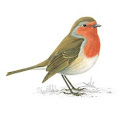A couple of weeks ago, I auditioned for an excellent choral ensemble here in Barcelona. I always get shaky and nervous during auditions, but fortunately they accepted me, and I am thrilled to be singing once again! I'm looking forward to getting to know a repertoire of Catalan music--my first full concert will be a Catalan sarsuela (zarzuela, in Spanish). One of the conditions of membership is that every singer take voice lessons biweekly, so I will also be returning to individual vocal study for the first time since college.
Last night we had the privilege of singing at the breathtaking Palau de la Música Catalana (click on "Guided Tours" and then "Virtual Tour" for a series of nice videos of the interior and exterior, or "Palau" for its history).
We were squished up in those red velvet seats flanking the organ in order to sing the Catalan national anthem, Els Segadors, at the end of an evening of musical and verbal tributes to Lluís Xirinacs. A long stream of public figures paid honor to Xirinacs' dedication to nonviolence and Catalan independence. Maria del Mar Bonet, a well-loved folk singer whose 1970s Catalan protest songs galvanized a generation, performed, along with many other Catalan musicians. The tenor of the evening, although filled with chants of "A Free Catalonia" and fists pumping in the air, was largely peaceful, given the example of Xirinacs himself.
However. When at last it came time to sing the Catalan anthem (which I had been frantically memorizing over the weekend), it struck me again how violent it is, and how ironic this violence given last night's context. The music itself sounds even more "militant" than the meaning of the words might indicate. People these days don't (usually) sing it in a spirit of violence, but the overall message is violent, and the lyrics were written about the Reapers' War of the 17th century. Like the American national anthem, which also commemorates a battle (from the War of 1812), this anthem links nationhood to a celebration of violent defiance. They are battle hymns.
I won't say much more about this except to lament it. I've long wished the American national anthem were something easier to sing and something a shade less bellicose. National identity, as represented by a song, should ideally be peaceful and pluralist. The Spanish national anthem is wordless, and perhaps this is the best way to go. However, recently a contest was held to add words to the anthem, resulting in some major controversy. For starters, the lyrics begin with "Viva España," inevitably reminding Spaniards (and Catalans, and Basques) of the dictatorship, when those very words represented the often violent oppression of "unacceptable" identities.
14 October 2008
Battle hymns
thoughts thunk by
Robin
at around
13:54
![]()
phylum or species: Catalan(s), Music
Subscribe to:
Post Comments (Atom)

No comments:
Post a Comment